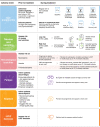Clinical Guidance on the Monitoring and Management of Trastuzumab Deruxtecan (T-DXd)-Related Adverse Events: Insights from an Asia-Pacific Multidisciplinary Panel
- PMID: 37552439
- PMCID: PMC10584766
- DOI: 10.1007/s40264-023-01328-x
Clinical Guidance on the Monitoring and Management of Trastuzumab Deruxtecan (T-DXd)-Related Adverse Events: Insights from an Asia-Pacific Multidisciplinary Panel
Abstract
Trastuzumab deruxtecan (T-DXd)-an antibody-drug conjugate targeting the human epidermal growth factor receptor 2 (HER2)-improved outcomes of patients with HER2-positive and HER2-low metastatic breast cancer. Guidance on monitoring and managing T-DXd-related adverse events (AEs) is an emerging unmet need as translating clinical trial experience into real-world practice may be difficult due to practical and cultural considerations and differences in health care infrastructure. Thus, 13 experts including oncologists, pulmonologists and a radiologist from the Asia-Pacific region gathered to provide recommendations for T-DXd-related AE monitoring and management by using the latest evidence from the DESTINY-Breast trials, our own clinical trial experience and loco-regional health care considerations. While subgroup analysis of Asian (excluding Japanese) versus overall population in the DESTINY-Breast03 uncovered no major differences in the AE profile, we concluded that proactive monitoring and management are essential in maximising the benefits with T-DXd. As interstitial lung disease (ILD)/pneumonitis is a serious AE, patients should undergo regular computed tomography scans, but the frequency may have to account for the median time of ILD/pneumonitis onset and access. Trastuzumab deruxtecan appears to be a highly emetic regimen, and prophylaxis with serotonin receptor antagonists and dexamethasone (with or without neurokinin-1 receptor antagonist) should be considered. Health care professionals should be vigilant for treatable causes of fatigue, and patients should be encouraged to use support groups and practice low-intensity exercises. To increase treatment acceptance, patients should be made aware of alopecia risk prior to starting T-DXd. Detailed monitoring and management recommendations for T-DXd-related AEs are discussed further.
© 2023. The Author(s).
Conflict of interest statement
Joanne Wing Yan Chiu received honorarium from AstraZeneca for consulting services and lectures related to the drug of interest; Soo Chin Lee received grants from Pfizer, Eisai, Taiho, ACT Genomics, Bayer, Karyopharm; consulting fees or honorarium from Pfizer, Novartis, AstraZeneca, ACT Genomics, Eli Lilly, MSD, Roche, Eisai; payments for lectures from Pfizer, Novartis, Astra Zeneca, ACT Genomics, MSD, Roche and Eisai; James Chung-man Ho received consulting fees or honorarium and lectures from AstraZeneca; Yeon Hee Park received grants AstraZeneca, Pfizer; consulting fees or honorarium from AstraZeneca, Pfizer, Lilly, MSD, Eisai, Roche, Daiichi Sankyo, MENARINI, Bixink, Everest and Novartis Pharmaceuticals; Payment for writing or review or reviewing manuscript for Lancet Oncology; and payment for lectures from AstraZeneca, Pfizer, Lilly, MSD, Eisai, Roche and Novartis Pharmaceuticals; Ta-Chung Chao has no conflicts of interest to disclose; Sung-Bae Kim received grants to their institution from Novartis, Sanofi-Aventis and DongKook Pharm Co; consulting fees or honorarium from Novartis, AstraZeneca, Lilly, Dae Hwa Pharmaceutical Co Ltd, ISU Abxis, OBI Pharma, Beigene and Daiichi Sankyo; and holds stock/stock options from Genopeaks and NeogeneTC; Elgene Lim received consulting fees or honorarium for advisory boards from AstraZeneca; provision of writing assistance (manuscript) by Medical Pharma Services; and payment for lectures by AstraZeneca; Ching-Hung Lin has no conflicts of interest to disclose; Sherene Loi receives research funding to her institution from Novartis, Bristol Myers Squibb, Merck, Puma Biotechnology, Eli Lilly, Nektar Therapeutics, AstraZeneca and Seattle Genetics. She has acted as consultant (not compensated) to Seattle Genetics, Novartis, Bristol Myers Squibb, Merck, AstraZeneca, Eli Lilly, Pfizer, Gilead Therapeutics and Roche-Genentech. She has acted as consultant (paid to her institution) to Aduro Biotech, Novartis, GlaxoSmithKline, Roche-Genentech, AstraZeneca, Silverback Therapeutics, G1 Therapeutics, PUMA Biotechnologies, Pfizer, Gilead Therapeutics, Seattle Genetics, Daiichi Sankyo, Merck, Amunix, Tallac Therapeutics, Eli Lilly and Bristol Myers Squibb; Sherene Loi is supported by the National Breast Cancer Foundation of Australia Endowed Chair and the Breast Cancer Research Foundation, New York; Su Ying Low received grants received from Boehringer Ingelheim; consulting fees or honorarium from Roche and Boehringer Ingelheim; payment for writing or reviewing manuscript from AstraZeneca; Lynette Teo consulting fees or honorarium and provision of writing assistance from AstraZeneca; Winnie Yeo consulting fees or honorarium from AstraZeneca and Daiichi Sankyo; payment for lectures from AstraZeneca and Daiichi Sankyo; Rebecca Dent has no conflicts of interest to disclose.
Figures


References
Publication types
MeSH terms
Substances
LinkOut - more resources
Full Text Sources
Medical
Research Materials
Miscellaneous

